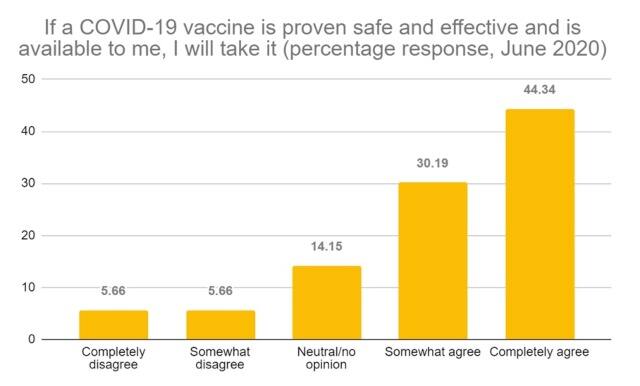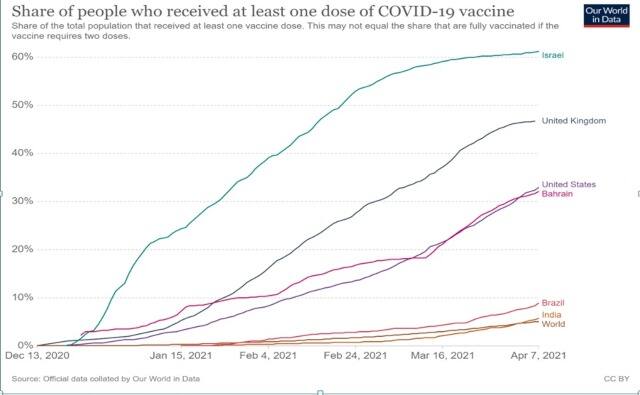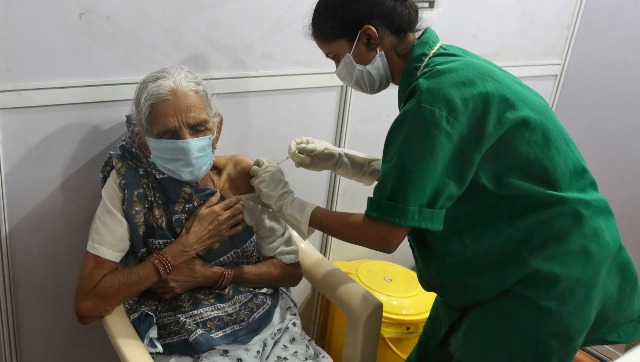With the second wave of COVID-19 looming large in India, it is imperative for governments to take necessary precautionary measures and for citizens to follow these diligently. For the major part of the pandemic thus far, we have dealt with the spread of the novel coronavirus using non-pharmaceutical interventions such as social distancing, mask-wearing, and regular handwashing. However, 2021 has brought with it vaccines to help build immunity against COVID-19, the first medical interventions to help combat the pandemic. Although all vaccines need to go through rigorous clinical trials before being approved for the general public, the turnaround time for the COVID-19 vaccine approval has been unprecedented. This fast-track process of approval as well as the spread of vaccine-related news via social media has led to individuals responding to the vaccine with some hesitation. To be sure, hesitancy to vaccines is in no way unique to the COVID-19 vaccine. However, it has been compounded by the ongoing experience of surviving in the COVID-19 pandemic and the associated uncertainty. Furthermore, adult vaccination in India has been understudied despite evidence that there are behavioural and attitudinal barriers to vaccination among adults in India. Past research on vaccine hesitancy suggests a 4Cs model - complacency (lack of perceived need), convenience (lack of accessibility or affordability), and confidence (lack of trust); and finally culture (a catch-all term for social, political and religious factors that may affect vaccine uptake). Although not much data exists on vaccine hesitancy in India, respondents from India in a survey conducted globally in June 2020 by Jeffrey Lazarus and colleagues find high acceptance of a potentially efficacious and safe vaccine. Of the 742 respondents from India that took part in the online survey, more than 70 percent said they would be open to taking the vaccine, as shown in the figure below: [caption id=“attachment_9526811” align=“alignnone” width=“640”]  Source: Lazarus et al. (2020)[/caption] More recently available data collected by the authors in collaboration with Behavioural Insights, Architecture, and Strategy Inc. (a New Delhi-based behavioural science firm) shows that widespread vaccine acceptance is still more than 70 percent in a small sample. However, the vaccine uptake research, as well as data on India relative to other countries, suggests that only a very small fraction have actually been vaccinated. For example, India has only vaccinated 5.7 percent of its entire population, whereas countries like Brazil (9 percent) and the United States (32 percent) are vaccinating at a faster rate. While the efficacy of available vaccines in terms of preventing COVID-19 infections differs, nearly all of them are 100 percent effective in preventing hospitalisations and deaths. [caption id=“attachment_9526821” align=“alignnone” width=“640”]  Source: Ourworldindata.org[/caption] Part of the argument is that government regulations and vaccine distribution may be constrained in India. But it is important to continue to tackle potential hesitancy in harder to reach populations that may still be accessing information on vaccines from various sources. More than 250 million users have access to social media, and they are often heavily influenced by misinformation, public figures, traditions, and superstitious beliefs, especially related to health. In the UK and Ireland, those with low/no trust in the vaccine are statistically less likely to obtain information about it from credible sources. Among the UK sample, those who were least likely to take the vaccine also displayed high levels of paranoia and religious beliefs and low trust in public authorities. Although studies on COVID-19 vaccination attitudes and perceptions in India are only beginning to emerge, smaller-scale evidence finds that knowledge about the vaccine is not necessarily positively correlated with vaccine acceptance. Even individuals from the medical community hold differing beliefs regarding the vaccine. The Indian government launched its vaccination drive on 16 January, 2021, and has delivered nearly nine crore doses till the present day. Since then, there have been attempts to tackle misinformation about the vaccine through various platforms, one of them being an Information, Education and Communication campaign. This campaign aims to highlight that several political heads and prominent medical professionals are getting vaccinated, suggesting a role-model effect at play. However, targeted information campaigns may be more effective, particularly those that could harness recent lessons from policy messaging around the world. For example, Katy Milkman and a diverse team of behavioural scientists found that having a message as simple as “a vaccine is reserved (or waiting) for you” can boost uptake rates in the United States. Given that the CoWIN portal is the primary means through which one can register for a vaccine in India, it may be worth running pilot experiments via the app testing different messages to boost vaccine uptake.
It is important now more than ever to continue following social distancing and mask-wearing practices even if most people around one have got vaccinated. Work by Armando Meier and colleagues in Sweden found that vaccine information and rollout reduces voluntary social distancing and adherence to stay-at-home guidelines, this is similar to a ‘ Peltzman Effect’ that has potentially altered risk perceptions of COVID-19. Thus, targeted behavioural interventions that contain an action-oriented message (e.g. “Get a vaccination today to help contain the burden of COVID-19!”) are likely to be most effective, particularly when risks continue to be uncertain.
Regardless of the type of messaging that takes place, it is critical that the logistics of vaccine distribution keep pace with messaging and state communication. In the absence of adequate infrastructure to administer vaccines to all those who require it, any behavioural intervention will just be putting the cart before the horse.
Anchal Khandelwal and Anirudh Tagat are with the Department of Economics at Monk Prayogshala, Mumbai. The data mentioned above are part of a project with BIAS Inc., New Delhi.


)

)
)
)
)
)
)
)
)



